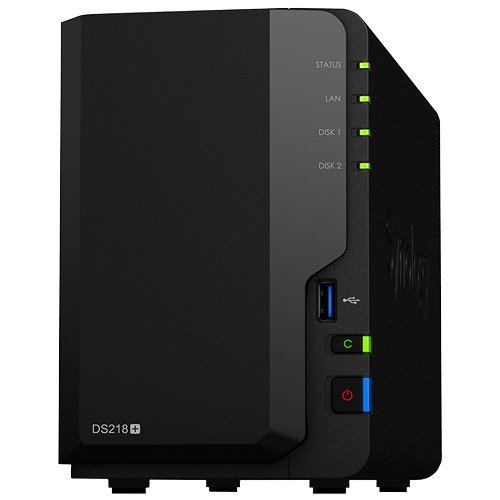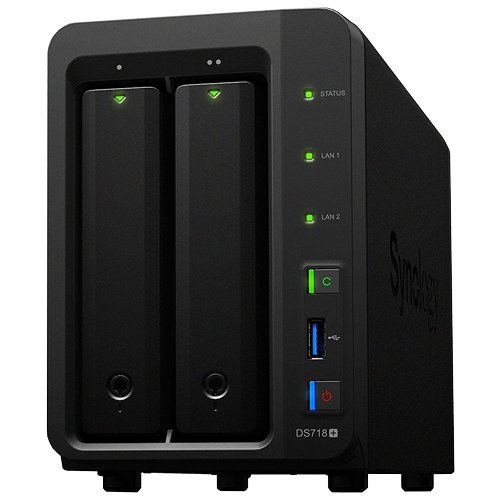Synology DS218+ vs Synology DS718+: Which should you buy?
When only the best Synology NAS will do.
All the latest news, reviews, and guides for Windows and Xbox diehards.
You are now subscribed
Your newsletter sign-up was successful

Affordable
The DS218+ is the best option if you're new to the world of NAS and only need a unit to contain a few TBs of data. It's also fairly quiet, only having a single fan on the rear. The only drawback is when you begin to run out of storage space.
Pros
- Compact size
- Quiet operation
- Affordable
Cons
- Limited capacity
- Less powerful CPU

Expandable
When planning ahead, you may find that you will need more than the storage capacity the DS218+ provides. This is where the optional expansion unit can come into play, bumping the total storage of the DS718+ to 84 TB.
Pros
- Slightly more powerful CPU
- Easy to expand for more drive bays
- Quiet operation
Cons
- More expensive
The Synology DS218+ is recommended by Synology to be ideal for those who are new to Network Attached Storage and we have no reason to disagree here. It's perfect if you're only just starting out. Where the DS718+ differs is by allowing the use of an expansion unit for an additional five bays. That's 84 TB of storage space, which can come in handy if you plan on storing a lot of data.
Synology's DiskStation DS718+ is more powerful
Looking at the two NAS models side to side may lead you to believe they're both identical, but that's not the case. Synology hasn't made them too different, which makes the decision making much easier for the consumer. All you need to know is one can make use of a further five bays, while the other cannot. Both could be a contender for the best NAS of old.
The pricing has the DS718+ a full $100 more expensive than the DS218+, which makes sense when you consider the use case for each NAS. The latter is a simple unit with two bays — that's all you have to work with. The DS718+ throws in support for an optional expansion unit. The internals is largely the same, only the processor having two more cores in the DS718+, but you shouldn't notice much of a performance bump.
| Header Cell - Column 0 | DS218+ | DS718+ |
|---|---|---|
| CPU | Intel Celeron J3355 Dual-core 2.0GHz | Intel Celeron J3455 Quad-core 1.5GHz |
| RAM | 2 GB Expandable to 6 GB | 2 GB Expandable to 6 GB |
| Bays | 2 | 2 |
| Expansion | - | 7 |
| Capacity | 24 TB | 24 TB + 60 TB |
| LAN ports | 1 | 2 |
| Weight | 1.30 kg | 1.74 kg |
| Power | 60 W | 65 W |
| Warranty | 2 years | 3 years |
The addition of one year for the DS718+ with its warranty also makes it worth the additional cost. That said, Synology NAS units are sturdy machines that will last way beyond the warranty period, so it's entirely down to whether you will ever need to add more capacity to your NAS.

The budget-friendly NAS
Powered by a dual-core Intel processor, it's possible to run a bunch of services on this NAS, effectively turning it into a media center. You can easily stream content to other devices around the home and even use it as file storage.

More powerful NAS
Taking advantage of a slightly more capable Intel processor, the Synology DS718+ can hook up to an expansion unit and enjoy a further five drive bays for up to 84TB of capacity.
All the latest news, reviews, and guides for Windows and Xbox diehards.

Rich Edmonds was formerly a Senior Editor of PC hardware at Windows Central, covering everything related to PC components and NAS. He's been involved in technology for more than a decade and knows a thing or two about the magic inside a PC chassis. You can follow him on Twitter at @RichEdmonds.
